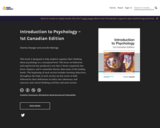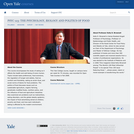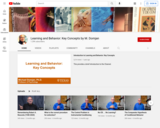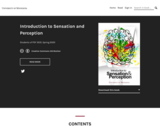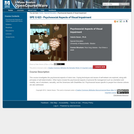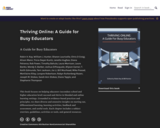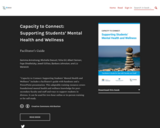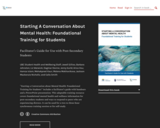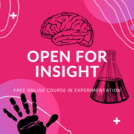
Chapters in the text can be assigned either from beginning to end, as with a conventional printed book, or they can be selected in some other sequence to meet the needs of particular students or classes. In general the first half of the book focuses on broader questions and principles taken from psychology per se, and the second half focuses on somewhat more practical issues of teaching. But the division between “theory” and “practice” is only approximate; all parts of the book draw on research, theory, and practical wisdom wherever appropriate. Chapter 2 is about learning theory, and Chapter 3 is about development; but as we point out, these topics overlap with each other as well as with the concerns of daily teaching. Chapter 4 is about several forms of student diversity (what might be called individual differences in another context), and Chapter 5 is about one form of diversity that has become prominent in schools recently—students with disabilities. Chapter 6 is about motivation, a topic that is heavily studied by psychological researchers, but that also poses perennial challenges to classroom teachers. Following these somewhat more basic psychological chapters, we turn to several lasting challenges of classroom life—challenges that seem to be an intrinsic part of the job. Chapter 7 offers ideas about classroom management; Chapter 8, ideas about communicating with students; Chapter 9, about ways to assist students' complex forms of thinking; and Chapter 10, about planning instruction systematically. The book closes with two chapters about assessment of learning: Chapter 11 focuses on teachers' own efforts to assess students, and Chapter 12 focuses on standardized measures of assessment. We have organized material and features in ways that we hope will allow for a variety of students, instructors, and institutions to use the book. For instructors and courses that seek a strong focus on research and the research process, for example, we have included an extra “chapter” on research methods—Appendix C, “The Reflective Practitioner”—that discusses the nature of research and the research process. We have also included a set of research-related case studies in Appendix B, “Deciding for yourself about the research”, that describe a number of particular educational research programs or topics in detail and that invite students to reflect on the quality and implications of the research. Whether or not a strong focus on research is a priority in your particular course, there are additional features of the book that are intended to help students in learning about educational psychology. In particular, each chapter ends with a “Chapter summary”, a list of “Key terms”, and links to Internet sites (called “Further resources”) relevant to the themes of the chapter. One of the sites that is cited frequently and that may be particularly helpful to instructors is the teachingedpsych wiki (http://teachingedpsych.wikispaces.com/), an archive of hundreds of teaching and learning materials that supports the teaching of introductory educational psychology. Teachingedpsych is a project of the Special Interest Group on the Teaching of Educational Psychology (TEP SIG), affiliated with the American Educational Research Association. All in all, we hope that you find Educational Psychology a useful and accessible part of your education. If you are preparing to be a teacher, good luck with your studies and your future! If you are an instructor, good luck with helping your students learn about this subject!
- Subject:
- Education
- Psychology
- Social Science
- Material Type:
- Textbook
- Provider:
- University of Manitoba
- Date Added:
- 11/22/2024

